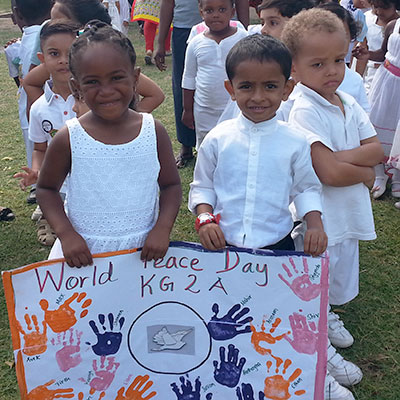

In a school comprising of young people from diverse cultural backgrounds and belief systems, respect is a key theme for the individual student.
The early years of a child's life are ones of rapid growth and development. The vital contribution of pre-school education lies in developing and broadening children’s learning experiences, leaving them confident, eager and enthusiastic learners.
At our Aga Khan Nursery School, children begin the Pre-School Programme at the age of 2. During this year, children learn through play, social interactions and activities that are developmentally appropriate and cater to their individual learning styles. The classroom is carefully organized to meet the specific needs of two to three years old. The teacher and the environment encourage child to develop a lifelong learning fueled by their inner curiosity. There is a well-balanced ratio of free play and planned activities to awaken the children’s interest and enthusiasm for learning.
Through the Pre-School Programme, each child has the opportunity to strengthen their language skills, refine their gross and fine motor skills and develop independence and confidence. Learning takes place inside and outside the classrooms, through an inquiry-based approach. This provides children with a wealth of exciting opportunities to acquire new skills, understandings and knowledge. The carefully constructed learning engagements provide for an enriching experience which helps to develop the whole child. Our AKNPS Nursery provides a safe and stimulating learning environment, where children get the opportunity to experiment, explore and discover.
The attributes of the IB Learner Profile are embedded in the Pre-School Programme to allow for a smooth transition when the children transition to the IB PYP programme at the age of 3, in KG 1.
The Primary Years Programme (PYP), for students aged 3–12, focuses on the development of the whole child, addressing social, physical, emotional and cultural needs, and is geared towards creating independent, confident and respectful learners.
At the Aga Khan Primary School Dar es Salaam, teaching and learning is centered around the principles and standards of the Primary Years Programme (PYP) which is designed for students from Kindergarten 1 to Grade 6 (ages 3- 12).
The PYP is an international, transdisciplinary programme designed to foster the development of the whole child, not just in the classroom but also through other ways of learning. The PYP encourages children to actively learn about the social and physical world around them and to become active learners and inquirers who take responsibility for themselves, their learning, other people and the environment.
The PYP seeks to enhance student's thinking skills and their environment and our changing world. It prepares students for the essential skills and understandings they will need for the future. It combines the best research and practice from a range of national systems with a wealth of knowledge and experience from international schools to create a relevant and engaging educational framework for all children. At the centre of the PYP is a commitment to structured inquiry. The children participate more in problem solving, asking questions, actively seeing explanations and forming original and appropriate hypotheses and generalizations.
The PYP consists of five essential elements: concepts, knowledge, skills, attitudes, and action. The knowledge element is enhanced through inquiry into six transdisciplinary themes:

The six principal subject areas include: language, social studies, mathematics, science, the arts and personal, social and physical education.
In Grade 6, all students work towards, and participate in, the PYP Exhibition through which they are able to showcase their understanding of the five essential elements described above.
As a PYP authorized school we strive to develop students who are:
At the Aga Khan Primary School, students work in collaborative open systems that allow them to research and make use of resources beyond the classroom and the school. Students are exposed to learning engagements that values their prior knowledge and use it as a basis for new understanding. During the learning process, students get involved in filling the KWHL charts, create questions and wonder and through teacher’s provocations students explore and create new understandings.
Students use the inquiry cycle to collect information, experiment and play with possibilities before making conclusions and reporting findings. Further, students have the opportunity to participate in nature walks (field trips) to expand their understanding.
Additionally, the Annual Student-Led Conference provides opportunities for students to celebrate their learning and engage their parents with inquiry based learning activities. In their final year, the students participate in concluding project known as PYP exhibition. Through an exhibition, students engage in an in-depth collaborative inquiry, which helps them to demonstrate independence and responsibility for their own learning as they explore multiple perspectives.
The Aga Khan students participate in celebration of different international days such as UN Day, International Mother Tongue Day, Book Week, engaging teachers with IB Professional development, inviting and visiting other IB schools during the exhibition as a way of connecting with the IB community.
To model the international mindedness, the School embraces celebration of international days throughout the year and the IB learner profiles and attitudes are used in student’s daily life. Parents are also encouraged to support their children to live the IB attributes beyond the School as teachers share with parents the philosophy behind the IB learner profiles.

© Aga Khan Schools 2009 - All rights reserved
Terms & Conditions | Privacy Policy
The Aga Khan Schools are part of the Aga Khan Education Services,
an agency of the Aga Khan Development Network
© Aga Khan Schools 2009 - All rights reserved | Terms & Conditions | Privacy Policy
The Aga Khan Education Services are part of the Aga Khan Schools,
an agency of the Aga Khan Development Network.